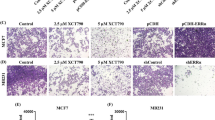Abstract
Angiogenesis activation mediated by vascular endothelial growth factor (VEGF) is one of the factors that can cause antiestrogen treatment failure in estrogen receptor (ER)?positive breast cancer patients. Since VEGF synthesis is modulated not only by hypoxia but also by steroid hormones, we investigated the relationship between hypoxic and estrogenic/antiestrogenic stimuli in two human breast cancer cell lines expressing both ER6α and ERβ (MCF7) or only ERβ (MDA-MB231). In both cell lines, the VEGF level was significantly influenced by hypoxic conditions and in antiestrogen-responsive MCF7 cells, this effect was not counteracted by tamoxifen or ICI 182,780, thus providing an experimental explanation for the resistance to endocrine treatment observed in patients with ER-positive tumors. In MDA-MB231 cells, estradiol significantly reduced the VEGF level, suggesting that through the ERβ isoform it may function as a negative modulator of VEGF synthesis under hypoxia, and providing evidence for a complex interplay of the estrogen-dependent and hypoxia-dependent pathways.
Similar content being viewed by others
Author information
Authors and Affiliations
Corresponding author
Additional information
Received 14 August 2003; received after revision 29 September 2003; accepted 23 October 2003
Rights and permissions
About this article
Cite this article
Coradini, D., Pellizzaro, C., Speranza, A. et al. Hypoxia and estrogen receptor profile influence the responsiveness of human breast cancer cells to estradiol and antiestrogens. CMLS, Cell. Mol. Life Sci. 61, 76–82 (2004). https://doi.org/10.1007/s00018-003-3324-0
Issue Date:
DOI: https://doi.org/10.1007/s00018-003-3324-0




